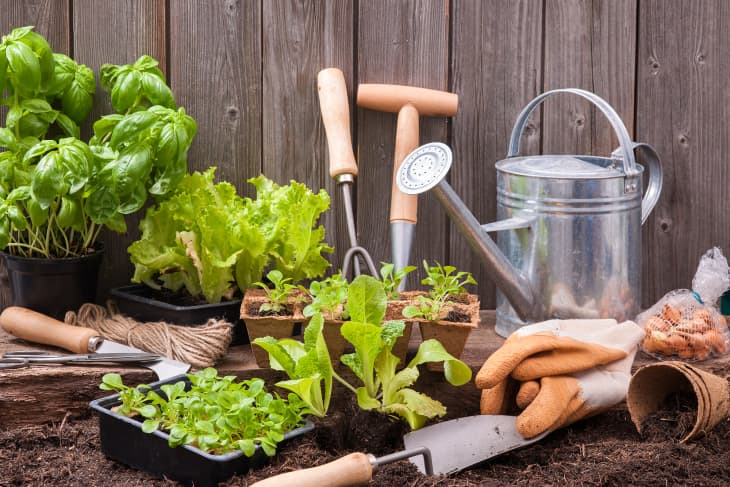This Old-School Method Keeps Your Gardening Tools Effortlessly Clean

As the sun finally makes its presence known, many home garden enthusiasts start getting to work in the yard. All of that planting, weeding, and pruning can be hard on both your back and your tools, which is why it’s important to make sure you’re tending to both. And while I can’t help you with your post-gardening aches and pains, I can tell you the easiest way to keep your tools clean and rust-free for whenever you’re ready to dig back in. All you’ll need is a bucket, a little oil, and a whole lot of sand.
What Is the Sand and Oil Method?
This is an old-school way of cleaning and oiling your tools that involves combining oil and sand into a large bucket where you plunge (and in some cases, store) your metal garden tools. Rhys Charles, CEO and founder of Mower on the Lawn, says that the sand acts as an abrasive that removes any dirt, sap, or rust from the metal parts of the tools, while the oil lubricates and protects them from corrosion. “The sand also gently hones the edges of the tools, making them sharper and more efficient,” he adds.
How It Can Save You Time, Energy, and Money
When you clean your tools this way you’re skipping the time-consuming step of washing and drying your tools after each use, according to Charles. “You just plunge them into the bucket or pot and they are ready for the next time.” It can also be a cost-effective alternative to some of those pricey products sold in home improvement stores. “You don’t have to buy expensive cleaners, sharpeners, or storage solutions for your tools,” he continues. “You just need some sand, oil, and a bucket or pot that you probably already have at home.”
You’ll also keep your tools in good working order for longer. “Rust is one of the biggest enemies of metal tools,” Charles says. “It can damage them beyond repair and make them unsafe to use. By keeping your tools in a moistened sand and oil mixture, you prevent oxygen and moisture from reaching the metal and causing rust.”
Why Your Plants Will Thank You
One of the major reasons it’s important to clean your gardening tools after each use is to prevent disease, insects, or other harmful things from being transferred from plant to plant. “Soil can harbor harmful bacteria, fungi, or pests that can infect your plants or yourself,” Charles explains. “By cleaning your tools with sand and oil, you remove any traces of soil that can carry diseases.” You can also prevent cross-contamination between different plants by disinfecting your tools as you go, according to Charles.
How to Make It
To create this DIY cleaner, Charles says you’ll need a sturdy bucket or a large flower pot, sand, and oil. He recommends mineral oil, baby oil (which he says is mineral oil with added fragrance), vegetable oil, or machine oil. (If you’re using these tools on edible plants, you should consider using food-grade mineral oil.) “Pour your sand into the bucket or pot, along with 20 to 30 ounces of oil,” says Charles, adding that you can use a garden tool to stir the sand and oil together until you feel like the oil has been evenly distributed throughout the container.
If you’re struggling to get a good mix of sand and oil, Dan Bailey, president of WikiLawn Tampa Lawn Care, has a gardening hack to try. “Rather than adding sand and then oil and then attempting to mix the two, try layering in sand and oil in even amounts,” he says.
How to Use It
When it comes time to clean your tools, Charles says you should just plunge them into the bucket and swirl them around. “The sand will act as an abrasive and remove any soil or sap from the metal parts of the tools,” he says. If you’re looking to sharpen your tools you’ll want to do the same thing as when you clean while repeating the plunging part several times.
If you want to store your tools in the bucket, which Charles says will help keep them “clean, sharp, and ready to use,” you can leave the metal portion in the sand with the handle sticking out for easy access. “This method works well for small trowels, hand tools, pruners, shears, and other metal gardening tools,” he says, adding that electric or pneumatic tools can be damaged by oil and sand and should not be cleaned this way.